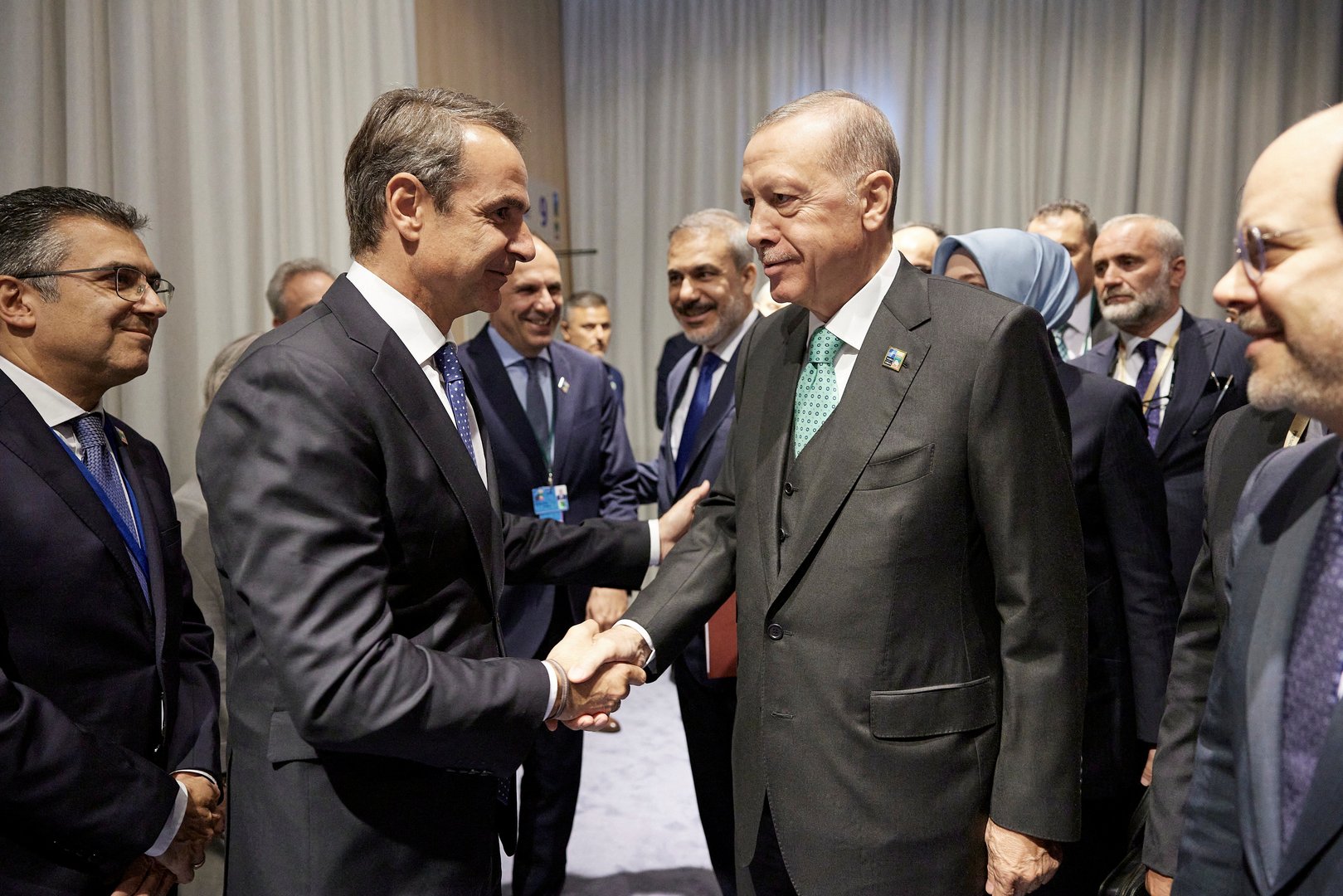The Cyprus problem did not get a mention at the eagerly awaited meeting between Prime Minister Kyriakos Mitsotakis and President Tayyip Erdogan on Thursday, which set the agenda for the ‘new start’ in Greece-Turkey cooperation. This will have disappointed some in Nicosia who had expectations of Cyprus being part of this dialogue.
The framework for better cooperation was based on three axes, said Mitsotakis after the meeting in Vilnius on the sidelines of the Nato summit, and Cyprus was not in there. The first and, arguably most important, was the political dialogue, under the foreign ministries of the two countries, that will deal with the differences over the delineation of sea zones, the EEZ and the continental shelf in the Aegean and Eastern Mediterranean.
Second were the confidence building measures which “can yield more fruits, building on the positive momentum of the last months” while the third axis related to the so-called positive agenda, said the Greek PM. The positive agenda involves cooperation on energy among other things. Even on EU-Turkey relations, in which the Cyprus government wants to include the Cyprus problem, Mitsotakis avoided mention, saying, “for sure improvement of Greek-Turkish relations will only help the approach of Turkey towards the EU.”
The reality is that the Cyprus issue has been left out of Greece-Turkey talks in the past and this is understandable. There are plenty of issues of dispute between the two countries in need of resolution, without adding another, which is not an area of direct confrontation, although it does have an impact on relations between the two countries. Some in Cyprus have maintained that Greece-Turkey relations cannot be put on a healthy footing without a Cyprus settlement, and the last 50 years back this contention.
There can be no doubt, however, that an extended period of sound Greece-Turkey relations, which has never materialised in the last 50 years, could create favourable conditions for a Cyprus settlement. Interestingly, the new international order taking shape, after Russia’s invasion of Ukraine and the division of the world into two rival camps may also contribute to the improvement of relations.
Erdogan, who has kept a foot in both camps since the start of the war, appears to have decided, for now at least, that Turkey’s interests are best served by committing to the West, hence his desire to re-open accession negotiations with the EU. He also appears to have reached an understanding with President Joe Biden on the F16 fighters and has lifted his objections to Sweden joining Nato. The signs are that he has returned to the Western camp, after a period of close cooperation with President Putin, but for how long is anyone’s guess.
Turkey’s re-alignment with the West boosts hopes about the prospects of cooperation with Greece but could also create what diplomats like to refer to as “a window of opportunity” for a Cyprus settlement which President Christodoulides has made his top priority. Indications are that the United States have plans for the Eastern Mediterranean – as a counter to Russian encroachment through Syria – and the mending of Greece-Turkey relations are of vital importance. There also appears to be a thaw in the frosty relations between Turkey and Israel with the two countries tentatively exploring the possibility of energy cooperation.
A Cyprus settlement would also be part of these plans, as it would resolve the energy disputes with Turkey, and allow the full exploitation of the region’s natural gas reserves. It appears the Cyprus government is preparing for a possible resumption of negotiations, leaking information on Friday that the president is likely to meet Turkish Cypriot leader Ersin Tatar in New York in late September in the presence of UN Secretary-General Antonio Guterres, who was also expected appoint a special envoy by then. UN officials were expected to visit the island, government sources have informed Cyprus News Agency.
There is little doubt that any new effort on Cyprus would be greatly assisted by growing cooperation between Turkey and Greece. Admittedly, there have been many false starts in this regard over the years, and sceptics would, justifiably, ask why it would be different this time. Perhaps the interest of the Americans in creating broader alliances in the region may be key. Also, Erdogan appears to have decided that Turkey, with its ailing economy, would be best served be re-aligning with the West and strengthening its cooperation with the EU. Mitsotakis’ Greece, which is firmly in the West, also recognises the benefits of friendly ties with Turkey. And there is also the issue of energy that could be resolved, to the benefit of all parties, through cooperation.
Whether all this materialises remains to be seen, but if it does it would usher in a new era in Greece-Turkey relations after centuries of hostility and mistrust. This change could offer a another “window of opportunity” for a Cyprus settlement.







Click here to change your cookie preferences